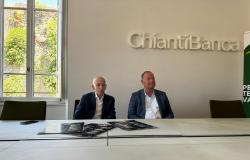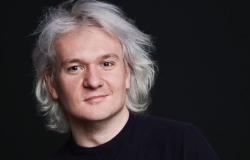Carried on the shoulders of his Alpine troops, as he wanted
Maurizio Adolfo
Surrounded by many pennants and flags and carried on the shoulders of his Alpine troops, he went to his final resting place on 3 January 1981. Adolfo Maurizio, born in 1921. A man of few words, but with many activities, forged from a young age by the tough battles of life as a mountain, he was able to distinguish himself in every field where life led him to act. Before him he was a valid champion in blue skiing and made his town of Oltre il Colle known outside the Bergamo area, and then he was an instructor for children for many years. As an entrepreneur he was always very busy driving trucks and bulldozers. For years he was part of the parish band. A pure-blood Alpine soldier, he took part with the 5th Alpine troops in the Russian campaign and in the sad retreat. He returned home physically marked, but indomitable. After 8 September he served in the «Green Flames», operating in the Oltre il Colle basin. After the war he re-established the local Alpini Group. «Your Alpine troops – the friends wrote in L’Eco – they fulfilled your last wish, to carry you on their shoulders to the cemetery”.
Archive of L’Eco di Bergamo
His shop was the home of music for everyone
Giovanni Ghisleri
Giovanni Ghisleri was very well known in the Bergamo musical environment, so rich in ancient traditions, an environment to which his family had always been closely connected. In fact Giovanni Ghisleri bore the name of his grandfather who had left the shop in Via Verdi to his son Achille. A man of exemplary activity, he had always taken care to supply his company with the most up-to-date instruments, following the natural technical evolution that also occurred in this field. Furthermore, he had lovingly followed and encouraged the emergence and development of bands in Bergamo and its province. Giovanni possessed a notable musical culture, he was friends with orchestra professors, music masters, enthusiasts of the musical art.
Archive of L’Eco di Bergamo
Hi dad, you flew to heaven too soon
Hi dad, you flew to heaven too soon, before I was born; Many years have passed now but I feel that from up there you have always watched over and protected me and my mother.
Lorenza Pozzi
Serious
Dear Silvana, «you will live forever in my heart»
23 years have passed since May 12, 2001, but you always live in my heart, together with the memories. I will always love you.
Your nephew Riccardo
Serious
His construction site companions came from France to greet him
Mario Birolini
Marino Birolini was 55 years old when lung congestion struck him at work in France. His life was tough: after his military service he was a prisoner in Germany and, upon his return, he immediately emigrated to Switzerland and then to France as a carpenter. Thanks to his skills and good will, he had earned the position of site manager at «Botomarme», a company that operated in the Paris area. After his death, a group of workmates wanted to go to Albino to pay him their final farewell, bringing a wreath of flowers and a commemorative plaque. The construction site staff has announced a collective visit to Birolini’s tomb as soon as possible.
Archive of L’Eco di Bergamo
Bus driver in Val Seriana, truck driver in Africa
Alessandro Moretti
Alessandro Moretti from Branzi has been accustomed to hard work and sacrifice since he was a child and has been able to fight and overcome all difficulties. As a teenager he went to work away from his family as a boy. He then participated in the First World War from which he returned decorated for military valor. Alessandro has always liked to define himself as a “boy from ’99”. After the war he began his career as a driver on the Branzi-Piazza Brembana line until his retirement. In 1936, difficult economic times led him to leave for East Africa with the hope of helping his family. He remained in Africa for seven years: first as a truck driver, then for 3 years as a prisoner of war without receiving any news from home. In 1943, upon returning to Bergamo, he resumed his job as a driver and actively participated in the civil life of his country first as a prefectural commissioner and then as a conciliator judge. In 1948, his son, Don Emilio became a priest and parish priest in Villa d’Ogna. Once he reached retirement, Alessandro didn’t stop and became a volunteer blacksmith in the parish and a member of the pastoral council, earning a gold medal for his commitment as an earthly reward.
Archive of L’Eco di Bergamo
The doctor who “ran” to patients day and night
Giuseppe Villa
Born in Calusco d’Adda, Dr. Villa graduated in medicine in Milan and began his profession as a substitute doctor in Calusco. He continued his activity as a medical officer in the Military Hospital of Trieste during the Second World War and subsequently received the appointment of doctor conducted in Dezzo di Scalve where he remained for 6 years doing his utmost for his patients regardless of the inconveniences and difficulties that the exercise of his profession, in those disadvantaged mountain areas, entailed. In 1953 he returned to Calusco where he continued his activity. With his death, a cordial, generous, serious and sensitive doctor has passed away. Villa carried out his profession with a sense of duty and a spirit of sacrifice, always ready to attend to the calls of his patients, for many years, day and night, before the medical reform recognized the doctor’s human right to night rest . Bergamasco by origin and tradition, he wanted to practice his profession until the end, even if for some years he could have allowed himself a fair and well-deserved rest.
Archive of L’Eco di Bergamo
They were different times, they were different people, ready to sacrifice
Isacco Boffelli
Isacco Boffelli was 84 years old and, although he had been suffering for some time, he remained as jovial as he had always been. He has never denied the esprit de corps of the Bersaglieri, in which he served during military service and during the Great War when he was wounded in the head, becoming a maimed and war invalid. Upon his return he was hired as a postman at the Tagliuno post office. He had to serve the entire territory of Tagliuno alone and with the few means of transport that existed at the time. He had a word of comfort for everyone and with his witty jokes he made everyone love him. For about 30 years he also served the Municipality of Castelli Calepio as municipal messenger: by combining the two jobs, he was able to carry out both offices as best as possible. He was in the office from the early hours of the morning, said one of his colleagues, and when the employees showed up for work, Boffelli had the offices ready and heated (the wood stoves were working then). He also diligently carried out the function of municipal messenger: on cold winter days he left on foot, or at most by bicycle, and ran to the hamlets of the municipality of Castelli Calepio (Cividino.Quintano and Castel dei Conti) to notify or for urgent calls. «Those were different times, you will tell me, – said a colleague – but I reiterate that there were other people and other wills always ready for sacrifice. During the typhus epidemic in 1944 in Castel de’ Conti, it was he who ran to pick up the sick and take them to the hospital and at the same time comforted the families affected by the disease.”
Archive of L’eco di Bergamo
It contributed to the golden age of cinemas in the city
Mario Riboli
Mario Riboli was born in Crema in 1911, but has resided in Bergamo since 1950. Sport was in his blood, it was like the distinctive sign of his chivalrous and frank soul. From a very young age he loved racing bicycles and was, around the years 1920-21, vice Italian amateur champion. Having approached football, he took Crema to Serie B, pouring into the undertaking all the enthusiasm he was capable of. Those were the times of Ghiandi, Mazza and other champions. In Crema he founded Pergolettese (later Pergo_Crema), a team that he managed to bring from the second division to Serie C. Settling in Bergamo immediately after the war, he also dedicated his attention to Atalanta, to whom he sold, among other things, a promising player , bred in the Pergolettese area: Zavaglio. But among the passions of Cav. Riboli also had cinema. In 1945 he took over the Enal cinema in via Gian Maria Scotti – which he would later call Ariston – from the Chamber of Labor and, thanks to his intuition and tenacity, transformed it into the busiest cinema in the city in those years. He had his own deep-rooted idea of cinema as a healthy entertainment for everyone. When he was no longer able to run the theaters, he entrusted the management to others. He participated in the foundation of the San Marco and Arlecchino cinemas, renovated the old Teatro Nuovo, and was involved in the management of the Cinema Italia (then Studio Capitol and now Cinema Capitol). After the death of his wife he struggled to get back on his feet, despite his nephew Luciano being close to him, whom he had raised like a son. However, he still felt useful and met everyone’s needs. «He who does well – he used to say – receives well».
Archive of L’eco di Bergamo
Grandma Lucia wanted the funeral in her Upper Town
Lucia Spini, Vedova Caffi
Native of Almenno San Salvatore, Lucia Spini moved to the Upper Town, in via Colleoni, after her marriage, where she was able to earn everyone’s respect and sympathy for her reliability of character and goodness of soul.
She was so fond of her “ancient Bergamo” that she insisted on her children (the 3 remaining of the 5 born from her marriage) until she obtained the promise that they would bring her back up for the funeral in case of the illness for which she had to be hospitalized in hospital had not ended favorably. The children (Diacle, Silvana and Luigi) and the grandchildren kept their promise: «Grandma Lucia returned to her Upper Town, where she resided for over half a century».
Archive of L’Eco di Bergamo





